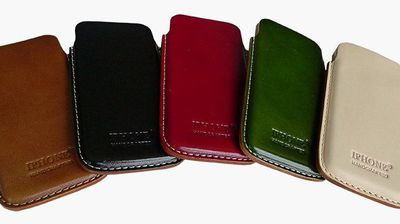Apple no longer has the exclusive rights to the "iPhone" trademark in China after the Beijing Municipal High People’s Court ruled in favor of leather goods manufacturer Xintong Tiandi Technology earlier in March. As reported by Legal Daily [Google Translate], the decision will let the Beijing company continue to sell leather bags and cases with the brand name "IPHONE" on each cover without fear of legal blowback from Apple (via Quartz).
The Cupertino company filed for a trademark of the iPhone name in China back in 2002, specifically centering around computer software and hardware, but Xintong Tiandi didn't do the same for leather goods until 2007, the year the iPhone launched in the United States. The leather case maker was granted that trademark in 2010. Following a few years of growing iPhone success, Apple decided to take the case to the Chinese trademark authority in 2012, subsequently filing a lawsuit in a lower Beijing court, and eventually losing both.

The Chinese trademark authority's decision stemmed from its belief that "the general public will not link the trademark in dispute with Apple to harm its [Apple’s] interests," stating that Apple could not prove "iPhone" was a well-known brand in China before Xintong Tiandi trademarked it in 2007.
Apple continued to appeal, all the way to the Beijing Municipal High People’s Court, but the final decision has come and echoes the trademark authority's conclusion that the company can't prove it was a known trademark before 2007, since Apple's iPhone didn't launch in China until 2009. The court's judgement also made no distinction between the two stylizations of Apple's "iPhone" and Xintong Tiandi's "IPHONE" moniker.
Apple retains the computer software and hardware rights to the iPhone trademark, but with the new ruling, Xintong Tiandi can continue to manufacture and sell its "IPHONE" branded cases to the Chinese public. The accessory maker hopes that Apple will work with it moving forward to create a market that is beneficial to both definitions of "iPhone" consumers.
Xintong Tiandi wrote on its website that the court’s decision is a reflection of a “free market.” “We will also make full achievement of the ‘iphone’ trademark, and work together [with Apple] to benefit more iphone consumers!,” it said on the site.
China is Apple's second largest market in total revenue following the United States, and the company has been following a steadfast strategy of expanding its presence in the country with numerous retail shops opening frequently over the past few months. Still, unease and concern with China's strict internet policies have led to a few mishaps with Apple products. Most recently, that included the unexpected closure of the iTunes and iBooks stores when a dystopian film depicting Hong Kong in an unfavorable light launched on Apple's digital platform in the country.
Update: In a new statement, Apple confirmed it intends to keep fighting the trademark battle with Xintong Tiandi, all the way up to China's highest court. “We intend to request a retrial with the Supreme People’s Court and will continue to vigorously protect our trademark rights,” the company said in a statement to the South China Morning Post.






















Top Rated Comments
Apple DIDN'T have a trademark for whatever category that leather goods fits under. Or did most of you not know that trademarks are categorized? Apple lost fair and square. If they wanted to prevent something like this, they should have filed for every related (including accessories) category.
And by the same token? Who CARES if someone stupidly believes this leather case with IPHONE stamped on the front of it is a genuine Apple product? It's just a cheap accessory. If it sells so darn well that it cuts noticeably into Apple's sales of its own phone cases, maybe it should start carrying them in its retail stores?